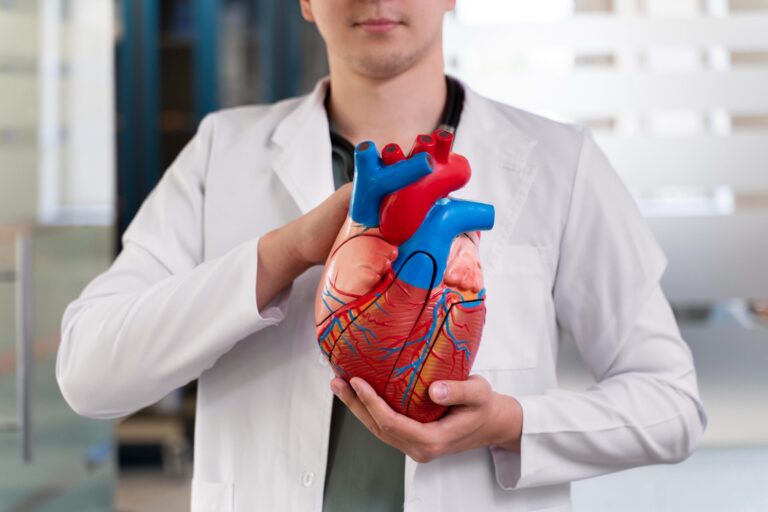Facing a cardiovascular emergency can be terrifying. Quick and effective treatment is crucial to prevent serious complications.
Cardiovascular emergencies include conditions like heart attacks and severe arrhythmias. These issues require immediate medical attention.
A private GP can offer timely and personalised care in such situations. Understanding what to expect can help you feel more secure and informed during a crisis.
Handling Cardiovascular Issues
When you face a cardiovascular emergency, a private GP will start with a quick assessment. They check symptoms and use diagnostic tools like ECGs. Immediate treatments are given to stabilise your condition. If needed, your GP will act quickly to get you to the right specialist or hospital.
Initial Assessment
Symptoms to Watch For
If you experience chest pain, shortness of breath, or dizziness, seek immediate help. These could be signs of a serious cardiovascular issue.
Diagnostic Tools Used
Your private GP will use tools like an ECG and blood tests to diagnose your condition. These tests help in identifying the problem quickly.
Immediate Actions and Treatments for Cardiovascular Care
Once diagnosed, your GP will administer necessary medication to stabilise you. They may also provide treatments to manage your symptoms and prevent further issues.
On-Site Management
Protocols for Dealing with Emergencies
In an emergency, a private GP follows strict protocols to manage your condition. They focus on stabilising you and providing immediate care.
Availability of On-Site Equipment
Private practices are often equipped with essential tools like defibrillators. This equipment helps in providing urgent care on the spot.
Coordination with Local Hospitals
If your condition requires more specialised care, your GP will coordinate with local hospitals. They ensure you are transferred smoothly and efficiently.
Referrals and Emergency Protocols for Cardiovascular Care
If your condition needs specialised attention, your private GP will refer you to the right specialist or cardiologist. They follow established emergency protocols to ensure you get the care you need quickly. Coordination with hospitals and specialists is key to providing seamless and effective treatment.
When to Refer to Specialists
Criteria for Referral
If your condition is complex or beyond initial treatment, your private GP will refer you to a cardiologist or other specialist. This might include cases of severe heart conditions or those needing advanced interventions.
Communication and Coordination
Your GP will communicate your case details to the specialist. They ensure a smooth transition and continue to coordinate with them to manage your ongoing care effectively.
Emergency Protocols
Standard Procedures for Transferring Patients
When a transfer to a hospital is needed, your private GP follows established procedures. This ensures that you are moved safely and promptly.
Emergency Contact Information and Networks
Your GP has a network of emergency contacts and services. They use this information to get you the urgent care you need quickly.
Working with Ambulance Services and Emergency Departments
Your GP coordinates with ambulance services and emergency departments. They work together to provide seamless care and ensure a smooth handover.
Follow-Up Care and Recovery Plans
After an emergency, your private GP will schedule follow-up appointments. They monitor your recovery and adjust your treatment as needed. They also help you with lifestyle changes to support your long-term health.
Post-Emergency Assessment
Importance of Follow-Up Appointments
Follow-up appointments are crucial after an emergency. They help ensure you are recovering well and prevent future issues.
Monitoring Recovery and Ongoing Symptoms
Your private GP will closely monitor your recovery. They check for any ongoing symptoms and adjust your care plan as needed.
Rehabilitation and Lifestyle Changes
Developing a Personalised Recovery Plan
Your private GP will create a recovery plan tailored to your needs. This plan helps guide your return to health and includes specific goals.
Recommendations for Lifestyle Changes
To support your recovery, your GP will suggest changes in diet and exercise. These adjustments help improve heart health and prevent future issues.
Support Resources and Counselling
Your GP may offer resources and counselling to aid your recovery. They provide support to help you manage stress and stay on track with your health goals.
Long-Term Management
Scheduling Regular Check-Ups
Your private GP will arrange regular check-ups to monitor your health. These appointments help catch any issues early and ensure ongoing care.
Adjusting Treatment Plans
Based on your recovery progress, your GP will adjust your treatment plan. This ensures that your care remains effective and tailored to your needs.
Conclusion
A private GP plays a crucial role in handling cardiovascular emergencies. Their personalised care and attention ensure timely and effective treatment. Continuity of care is essential for the best outcomes.
For emergencies, contact your private GP directly. Having a regular GP is important for ongoing health management and consistent care.

